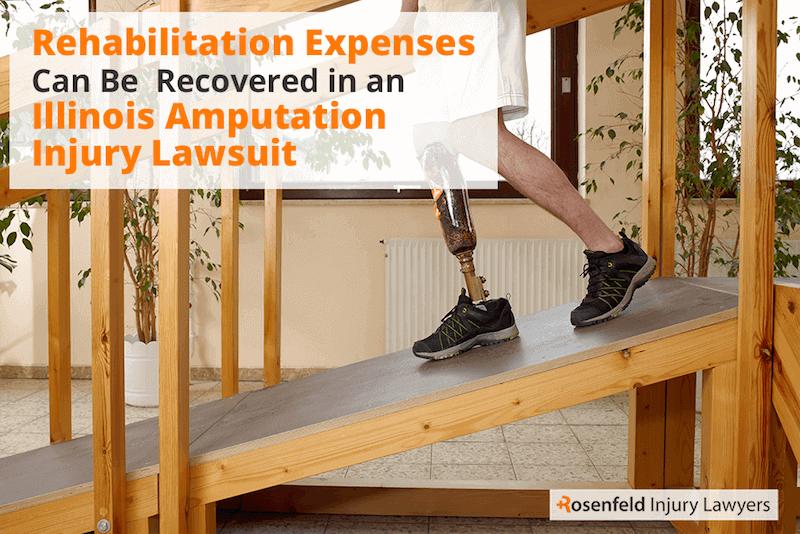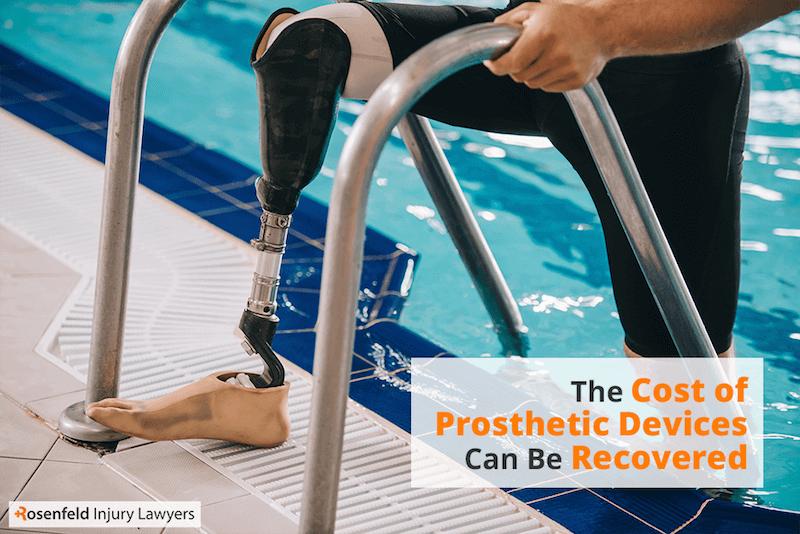Award-Winning Chicago Personal Injury Lawyer - Securing Justice
for Illinois Injury Victims - Over $450 Million Recovered
Working with an experienced Chicago amputation injury lawyer can help you navigate the legal complexities of an amputation injury claim. Suffering limb loss, whether due to a traumatic accident, severe infection, or a necessary surgical amputation, is a life-altering event that impacts every aspect of your personal and professional life.
If your limb loss resulted from someone else’s negligence, you may be entitled to compensation for medical bills, lost income, prosthetic limbs, and pain and suffering.

Amputation injuries are serious, life-altering events that require immediate medical attention and long-term care.
Approximately 54% of these catastrophic injuries occur because of vascular diseases or other health conditions like diabetes and peripheral arterial disease (PAD) that disrupt blood circulation. However, 45% of amputations can be attributed to traumatic injuries.
Some of the most common causes of traumatic amputations include:
Amputations vary based on location, severity, and medical factors. Common types include:
Understanding the impact of an amputation is essential, as it often affects many aspects of life. Common consequences include:
Medical Complications: Risks include serious infections, blood clots, and cardiovascular strain.
Our experienced team of amputation attorneys handles a wide range of cases. Here are some of them to give you a better sense of the representation available to you:
When faced with an amputation due to someone else’s negligence, exploring your legal options is crucial for ensuring financial stability and securing justice.
Personal injury law allows you to recover compensation for any harm caused by another individual’s negligent or willful actions. Our Chicago personal injury lawyers can assist you in filing an amputation injury lawsuit if limb loss occurs due to someone else’s actions.
This type of amputation lawsuit typically provides compensation for medical expenses, lost income, and decreased earning capacity.
If your amputation injury occurred at work, regardless of whether your employer was negligent, you might be able to file a workers’ compensation claim with the help of an experienced Chicago workers’ compensation attorney from our team.
The benefits provided under workers’ comp usually include payment for necessary physical therapy and pain management related to the injury, as well as wage replacement and possibly vocational training.
Under the Illinois Workers’ Compensation Act (820 ILCS 305), employees are entitled to compensation for work-related injuries, including permanent partial disability benefits for amputations (820 ILCS 305/8).
In cases where an amputation injury results in a fatality, the person’s family members may be able to file a wrongful death suit by contacting our Chicago wrongful death claim attorneys.

If you’ve suffered an amputation due to negligence or a workplace accident, working with an experienced lawyer is key to protecting your future. Our team guides you through every stage of the legal process, starting with a free consultation to assess your options.
We investigate your case thoroughly, reviewing medical records, reports, and safety violations. Based on the facts, we determine whether to pursue a workers’ compensation, personal injury claim, or both. We handle all filings, ensure deadlines are met, and manage the discovery process, including gathering and exchanging key evidence.
Our goal is to resolve your case through negotiation whenever possible. If a trial is necessary, we’ll be fully prepared to represent you in court and fight for the outcome you deserve.
The scope of legal liability in amputation cases includes various entities depending on the context of the accident. Here are some of the most common parties that are held responsible:
Each situation requires careful legal analysis to identify all potential sources of liability and ensure that injured victims receive full compensation for their losses.
In an amputation case, proving liability hinges on demonstrating the following elements:
Proving these elements requires solid evidence, such as eyewitness testimony, accident reports, medical records, and expert testimony.
Under Illinois law (735 ILCS 5/13-202), you generally have two years from the date of the accident to file a personal injury amputation claim. In Chicago, these cases are typically filed in the Circuit Court of Cook County, located at the Richard J. Daley Center.
Per the Illinois Workers’ Compensation Act (820 ILCS 305/6), for work-related amputations, you must report the injury to your employer within 45 days, and file a claim with the Illinois Workers’ Compensation Commission (IWCC) within three years of the injury or two years from the last benefit payment, whichever is later.
Deadlines can vary based on the facts of your case, so it’s best to speak with a personal injury attorney as soon as possible to protect your rights.

If you or someone close to you has suffered an amputation due to a workplace injury, it’s crucial to know the types of compensation available.
Under workers’ compensation benefits, accident victims usually receive coverage for medical expenses related directly to the injury and a portion of their lost wages while they are unable to work. Depending on the severity of the injury, vocational training or permanent disability compensation could also be available.
However, depending on the circumstances, you may be entitled to file a personal injury claim instead of or in addition to the workers’ comp claim. This type of claim provides more comprehensive damages, including medical costs, lost income, and physical pain and suffering.
When it comes to financial compensation for the loss of a limb, particularly in accident cases, there is no predefined amount; the compensation varies based on individual circumstances.
Each case is fundamentally distinct, with various factors determining the final settlement or court award. This includes:
There’s no fixed timeline for settling an amputation case, as it depends on several factors.
Severe or complex injuries often require extended medical treatment and evaluation, which can delay resolution. If liability is disputed, the case may take longer to settle compared to situations where fault is clear. Additionally, delays from uncooperative insurance companies can lead to prolonged negotiations or the need for litigation.
At Rosenfeld Injury Lawyers, we operate on a contingency fee basis. This means that you pay nothing upfront. Our fees are contingent upon securing compensation for your injuries and are deducted from that. In the event of no financial recovery, you will not owe us anything at all. We believe in minimizing clients’ financial risks while aggressively pursuing justice on their behalf.

Whether your amputation was due to a work-related incident, medical malpractice, or an accident caused by someone else’s negligence, Rosenfeld Injury Lawyers is here to help you hold the negligent parties accountable and pursue compensation for recovery and adjustment.
Don’t hesitate to contact us to schedule your free consultation. Call us at (888) 424-5757 or contact us online to discuss how we can assist you.
All content undergoes thorough legal review by experienced attorneys, including Jonathan Rosenfeld. With 25 years of experience in personal injury law and over 100 years of combined legal expertise within our team, we ensure that every article is legally accurate, compliant, and reflects current legal standards.